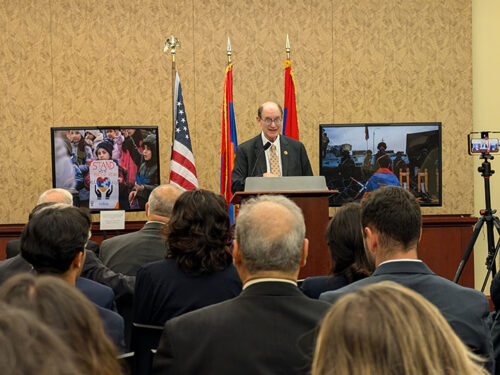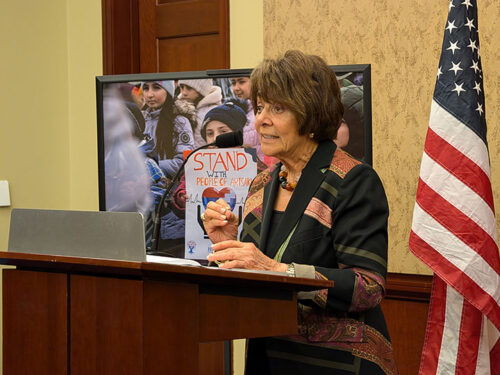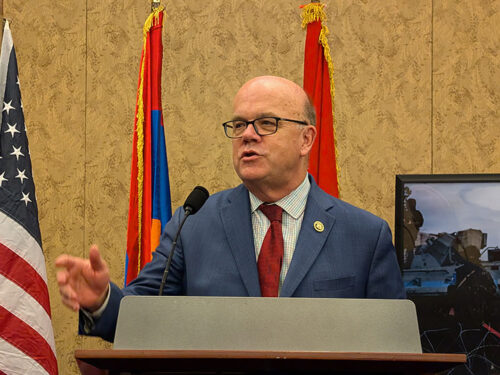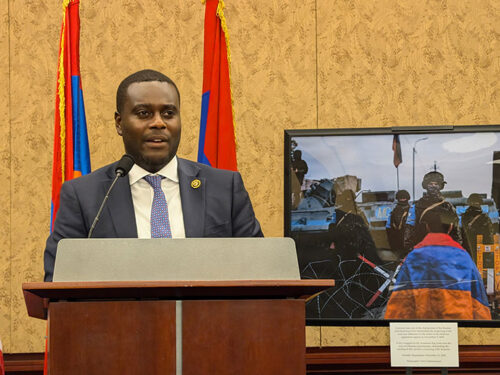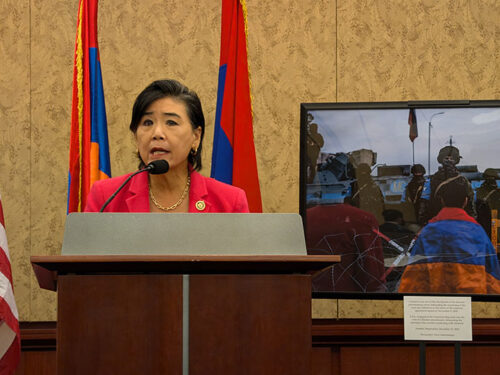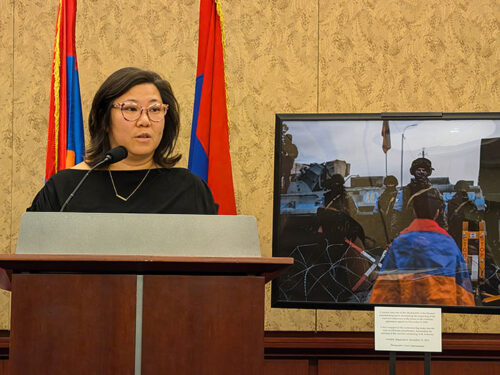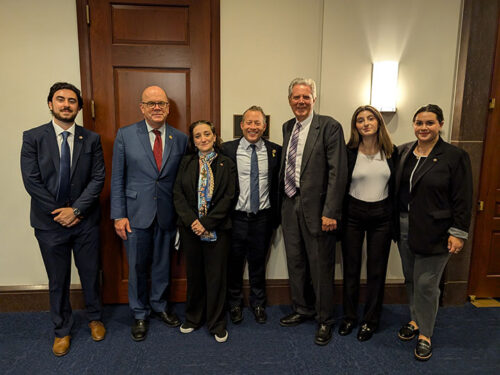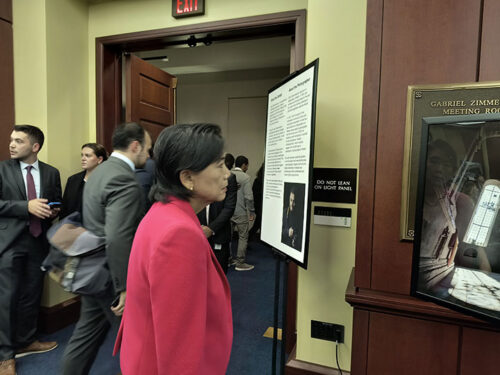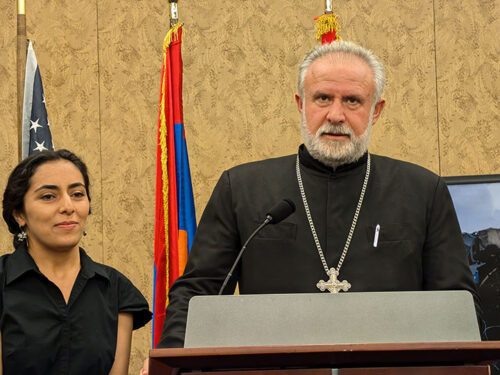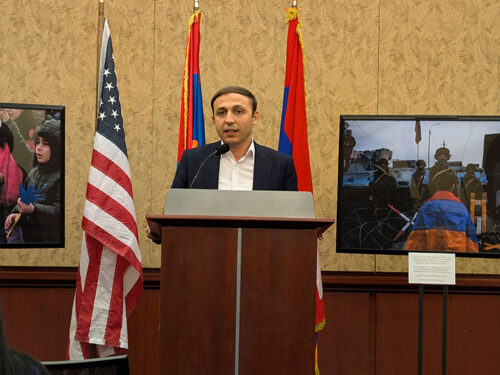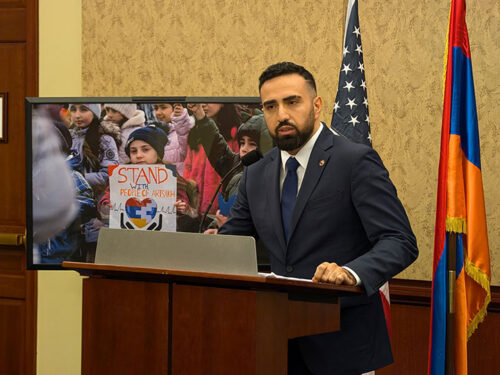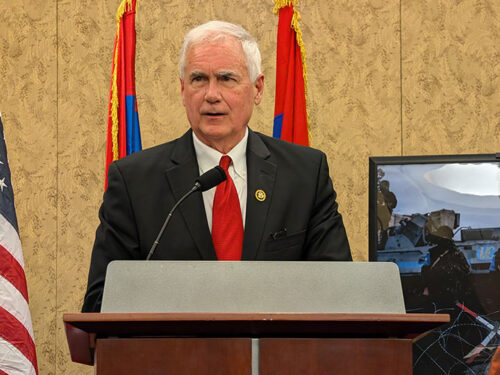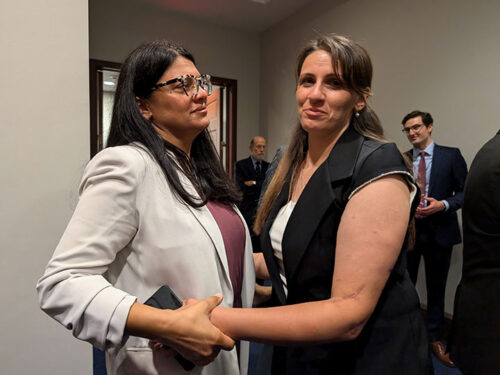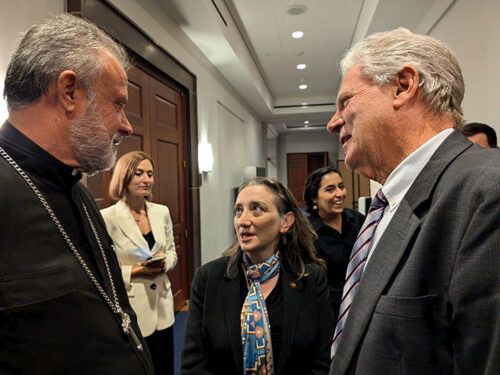U.S. Legislators, Community Leaders, and Coalition Partners Rally on Capitol Hill for the Return of Armenians to Artsakh
ANCA Program Features Bipartisan Congressional Calls for Azerbaijani Accountability
September 20, 2024Washington, DC— U.S. lawmakers, Armenian community advocates, coalition partners, and Artsakh Genocide survivors gathered on Capitol Hill at the Armenian National Committee of America’s (ANCA) “Accountability | 2024” event, marking a full year of impunity for Azerbaijan’s September 19-20, 2023, military offensive and ethnic cleansing of Artsakh. Azerbaijan’s attack, after ten months of blockade, culminated in the genocide of over 120,000 indigenous Armenians from their historic Artsakh homeland.
The September 19th Capitol Hill program was the capstone of a week-long advocacy “fly-in” organized by the ANCA Eastern and Western regions, which brought over 75 chapter leaders and activists from across the U.S. to the nation’s capital. The delegation met with legislators to advance a broad array of measures aimed at holding Azerbaijan accountable, aiding Artsakh refugees, and forging a path for the safe return of Armenians to Artsakh under international protections.
ANCA National Grassroots Director Gev Iskajyan, who worked in Artsakh for two years throughout the blockade and subsequent forced deportation of the Armenian population, opened the program with powerful remarks: “Today, we gather not just to remember, but to demand justice. A year has passed since the final blow of Azerbaijan’s assault on Artsakh, and yet, the international community remains silent. This is not just a loss of territory but a loss of culture, identity, and history — an entire people forcibly uprooted from their ancestral home. We refuse to accept this as the end. We demand the right of return for every displaced Armenian under international protection. ‘Artsakh lives’ because its spirit is alive in every one of us fighting for justice.”
Members of Congress stressed the importance of 1) enforcing prohibitions on U.S. military assistance to Azerbaijan according to Section 907 of the FREEDOM Support Act, 2) the imposition of Global Magnitsky Act Sanctions on Azerbaijani officials responsible for war crimes, 3) an investigation into Azerbaijani human rights abuses under Section 502B(c) of the Foreign Assistance Act, and 4) a commitment to ensuring the right of Armenians to return to their homes under international protections. Members also called for a robust humanitarian response to meet the needs of Armenian refugees displaced by Azerbaijan’s aggression. Several lawmakers spoke out against the “greenwashing” of Azerbaijan’s human rights record by allowing them to host the COP29 Climate Conference in Baku.
The entire program was live-streamed on the ANCA’s social media platforms
Rep. Grace Meng (D-NY), a member of the House Appropriations Committee who has been a tireless advocate for expanded aid to Artsakh refugees, emphasized the ongoing need for action: “From the Armenian Genocide 100 years ago to the ethnic cleansing of Artsakh just last year, your resilience has spanned centuries. We must ensure that Armenians who were forcibly displaced are compensated without forfeiting their right to return to their homes,” stated Rep. Meng, who also highlighted her support for the bi-partisan Artsakh Revenue Recovery Act (H.R.9666), introduced this week by Rep. Adam Schiff (D-CA).
Rep. Judy Chu (D-CA), who visited Artsakh and was subsequently banned from Azerbaijan by President Aliyev as a result, expressed her horror at the forced displacement of Artsakh’s Armenians: “It is heartbreaking to consider that the people I met just a few years ago are now refugees. The United States must reject this ethnic cleansing and stand clearly for democracy, self-determination, and peace.” Chu also criticized Azerbaijan’s hosting of COP29, noting, “Azerbaijan, a country with a shameful human rights record, should not be given the platform to rehabilitate its image through the COP29 conference.”
Rep. Gabe Amo (D-RI), who reiterated Iskajyan’s powerful mantra – ‘Artsakh Lives’ – called for unwavering commitment to human rights: “We cannot and will not be silent in the aftermath of Azerbaijan’s brutal campaign of ethnic cleansing in Artsakh. Our dedication to human rights is ironclad,” stated Rep. Amo, who expressed his support for efforts to hold Azerbaijan accountable through the Artsakh Revenue Recovery Act.
Rep. Anna Eshoo (D-CA), who is Armenian and Assyrian and has long fought for justice for Turkey and Azerbaijan’s genocidal actions, expressed deep frustration over the lack of international action: “The world failed to act, and Azerbaijan has yet to face meaningful consequences for its crimes. We must ensure that the right of return is honored, and that the cultural heritage of Artsakh is preserved.”
Rep. Brad Sherman (D-CA), who condemned Azerbaijan’s ongoing cultural genocide against Artsakh’s Armenians, highlighted the need for true justice: “True justice is when displaced Armenians can return to their ancestral homes, where they have lived for more than a millennium. We cannot allow Azerbaijan to erase their history and heritage.”
Congressional Armenian Caucus founding Co-Chair Rep. Frank Pallone (D-NJ), who has visited Artsakh more than any other U.S. legislator, reiterated the Artsakh people’s right to return to their homes. “We’re going back… that’s the bottom line.” Rep. Pallone referenced his most recent bi-cameral effort, with Senator Ed Markey (D-MA), circulating a letter regarding Azerbaijan’s hosting of the COP29 United Nations Climate conference to showcase Azerbaijan’s genocidal actions and ongoing repression of human rights
Rep. Jim McGovern (D-MA), Co-Chair of the Tom Lantos Human Rights Commission, underscored the moral responsibility of the U.S.: ” It is important that the United States and the international community work together to hold Azerbaijan accountable for its ethnic cleansing and forced displacement of ethnic Armenians from their homes. And it is important, quite frankly, that we be louder and more forceful in our advocacy, because I believe, and I know all of you believe, that if the United States of America stands for anything, we need to stand out loud and four square for human rights.”
Central Valley California Rep. Tom McClintock (R-CA), explained, “I believe this tragedy we look back upon as a warning. The civilized nations of the world cannot ignore injustice and conquest and genocide without encouraging more of it and ultimately bringing it upon themselves. I think all of us in the United States government, all of us in Congress, look back with regret that we focused our attention elsewhere as this tragedy unfolded.”
Rep. Rashida Tlaib (D-MI) spoke to the shared experiences of displaced peoples: “I want you all to know, no matter who it is, I will be always consistent in fighting against ethnic cleansing, again, no matter where it happens. And you all give me so much hope.”
Other members of Congress who joined in marking and condemning Azerbaijan’s genocidal ethnic cleansing of Artsakh were Congressional Armenian Caucus Co-Chair David Valadao (R-CA), who had visited Artsakh in 2019, and New Jersey Representative Josh Gottheimer (D-NJ).
In his moving keynote remarks of the evening, Republic of Artsakh Human Rights Defender Gegham Stepanyan, explained, that a year after the ethnic cleansing of Artsakh, despite the inadequate response of the international community to prevent this genocide, “we do not have the right to give up our fight for the return of our people, the preservation of our culture, and the release of our prisoners.”
The evening’s closing prayer was offered by Fr. Hovhannes Hovhannisyan, the abbot of Artsakh’s historic Dadivank Monastery, who survived Azerbaijani bomb attacks on his home, targeted for his defense of Armenian religious and cultural sites. He described Azerbaijani brutality during the Artsakh war, blockade, and subsequent ethnic cleansing, noting: “If the entire world would have recognized the 1915 Armenian Genocide today, there would not have been another one happening. And if we do not recognize the Artsakh Genocide today, there are going to be more to follow.”
The event featured images from a photo exhibit – “Real-Time Genocide: Artsakh” – by Artsakh photojournalist Davit Ghahramanyan, an eyewitness to Azerbaijan’s aggression, who captured the human toll of Baku’s 2020 military attack and the 2023 blockade and subsequent forced expulsion of Artsakh’s Armenians. His photos showcase the resilience and humanity of Artsakh’s Armenians in the face of relentless brutality, and highlight their determination to return home. The exhibit is a stark reminder of the human cost of Azerbaijan’s aggression, and serves as a call for global recognition of Artsakh’s aspirations for peace and justice.
The full photo exhibit, curated by Ghahramanyan and renowned Artsakh writer and poet Hermine Avagyan, is presented at the Russell Rotunda from September 19th to September 27th, made possible through the leadership of Senator Sheldon Whitehouse (D-RI) and the efforts of the ANCA and Hamazkayin Armenian Educational and Cultural Association.
#####
